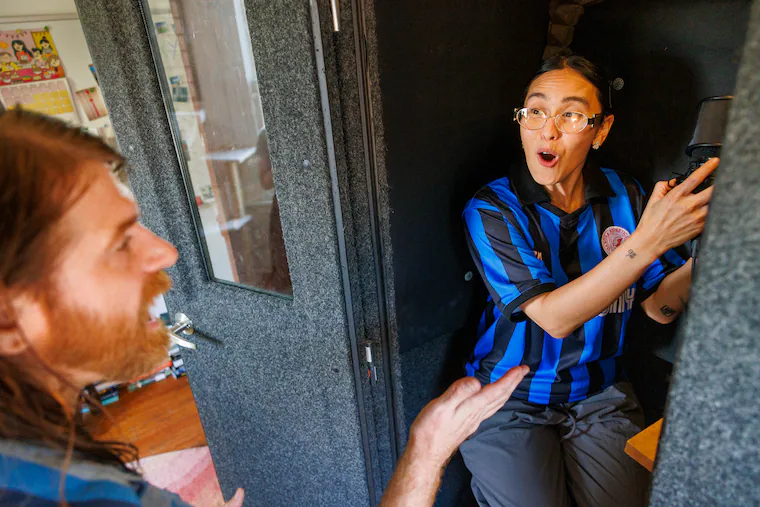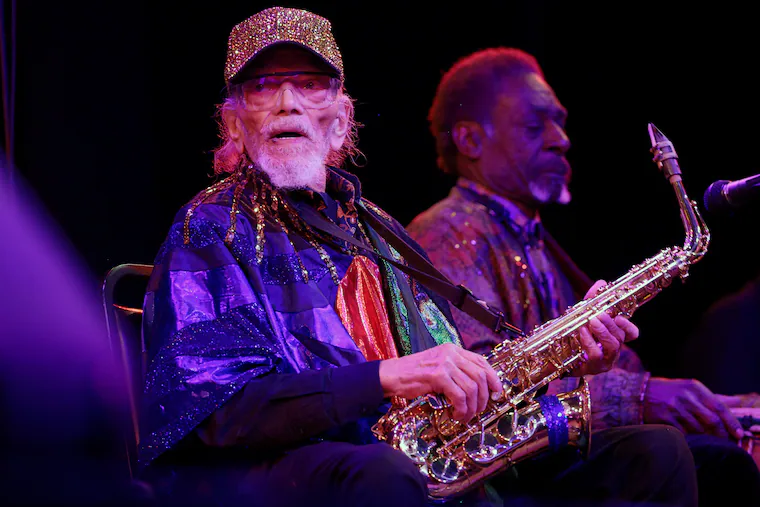
George had a problem, and he had reached out to Yowei Shaw for help.
After a decade-plus relationship, his wife had come out as queer and divorced him. (George is a Midwesterner using a pseudonym.)
Shaw, the Philly-based creator and founder of the new podcast Proxy, listened to his story and began her search for help.
The divorce wasn’t the issue — it was more the dizzying emotional disorientation that followed. George had gone to therapy and divorce groups and talked with friends, but no one could exactly relate. His ex wasn’t eager to talk. Most fundamentally, he wanted to understand how his life had changed so suddenly.
So Shaw tracked down the perfect proxy: a queer woman who had also left her straight marriage and was open to talking it through with George.
The recorded conversation that followed was an intimate and revealing one between two people who had never met, but who understood something vital about each other’s lives.
That is Proxy.
Half its episodes are recorded social experiments, where guests are paired with strangers who serve as proxies to help solve their “niche emotional conundrums”; the other half is a broader exploration of how emotions impact hot-button issues like polarization or restorative justice.
Shaw, 37, jokingly calls herself an emotional investigative journalist — but she’s not really joking.
“We believe you can get special insight by talking to a stranger who’s outside your situation — because you can ask questions you wouldn’t be able to ask, say things you wouldn’t be able to say, be less defensive, more open,” she explained on George’s episode, “Bisexual Wife Guy.”
Finding the perfect stranger
For different cases, Shaw has tracked down different kinds of proxies: On some episodes, guests are paired with researchers who have the ideal expertise; on others, they’re matched with peers who have gone through a similar experience, as in a support group.
The most thrilling episodes pair a protagonist, like George, with a stranger-antagonist, someone who has experience similar to that of the “villain” in the guest’s story.
Shaw asks certain questions before determining whether a guest is right for the show: Do they have other supports? Are they in active trauma? (If so, they aren’t a good fit.) Is the conundrum primarily an emotional one, making it right for the show, or is it a material one?
Despite the ubiquity of podcasts, it’s not a particularly easy time to launch a new, independent one, especially if you’re not a celebrity.
Shaw, who grew up in Pittsburgh and Houston, first fell in love with audio as a student at the University of Pennsylvania, before the 2015 Serial boom. As a freelancer, she taught youth media, worked as a temp on Fresh Air, reported stories for shows including This American Life, and then became a full-time producer and host of NPR’s popular science show, Invisibilia.
In 2023, the show was canceled and Shaw was laid off from NPR, part of an industry-wide bust that made up what Vulture described as “the podcast world’s year from hell.”
Shaw had already been toying with the idea of proxy conversations. She found that when she was struggling personally with a complicated emotional question, she tended to make headway if she reported on it.
“I would feel less stuck by the end,” she said. “That seemed like magic to me.” She was also drawn to the drama and discovery.
She pitched the idea for Proxy to a number of companies, but she didn’t want to give up ownership of her intellectual property, so no deals panned out.
In May 2024, she launched the show herself, with a Patreon where listeners support the effort. She has since joined Radiotopia from PRX, an independent network of podcasts that distributes and sells ads for shows.
Her husband, Kyle Pulley, a music producer who co-owns Headroom Studios in Clifton Heights, agreed to help with the sound mixing. Shaw refers to Pulley as her “bedraggled podcast spouse,” and his reluctant involvement is a running joke on the show. (“I feel like a lot of the PSAs are directed towards me,” he observed in a recent episode.)
“My main tip for people trying to start a podcast: Marry someone who knows how to do all the recording and mixing,” Shaw joked.
The effort is enormous, and the chance of making a true hit — a show that could support Shaw and a small team— is slim, Shaw said. She is still trying to figure out how to gain listeners and ask for money (the topic of a recent episode).
She will not say how many listeners the show has currently, though it charted at No. 2 in science podcasts this year, and made a Top 150 list of podcasts globally. She received two media grants this summer and is planning a major fundraising campaign.
“I have to do emotional gymnastics with myself every day to delude myself into thinking, ‘Oh, yeah, it’s gonna be a hit.’ And then that gives me the motivation and the right energy to bring to the project,” she said.
Many of the initial guests and proxies are known names in the podcasting world, from S-Town host Brian Reed, who came on the show to talk about his struggle caregiving for his mother-in-law with Alzheimer’s, to Radio Atlantic host Hanna Rosin, who served as George’s proxy.
Perhaps because of that, the show can sometimes be overwhelmingly meta. The first three episodes are about Shaw being laid off from NPR, working on a story about layoffs that got canceled, and then interviewing the characters in the story about what it was like to be “laid off” from the story.
A home production company
Proxy is recorded from a Whisper Room sound booth on the second floor of Shaw and Pulley’s Wissahickon rowhouse. Pulley tricked out the booth with a desk and aluminum clamp lights. Shaw is quick to share that she has accidentally peed in the booth twice during interviews she didn’t want to end prematurely.
“Don’t worry, I’ve thoroughly cleaned and sterilized everything,” she said.
Because Shaw is producing the show almost entirely herself on a shoestring budget — with the help of editor Tim Howard and sometimes part-time producers — the hours are long and constant, with Pulley helping out on top of his full-time job.
“You are released from duty!” she called to Pulley after he helped her change the voice of an interview subject for an episode about estrangement.
“We had a talk the other day where I was like, ‘Kyle, thank you so much for all your help on the podcast, but I do need you to be a little less grumpy during Proxy meetings,’” Shaw said.
For future episodes, Shaw is soliciting cases from listeners, hoping to find the perfect proxies for them, as well as the perfect rhythm for an independent show.
She said she’s driven by a desire to get to the emotional root of things.
“Emotions are a huge part of every story, of every problem, of every issue,” she said, “and we don’t pay enough attention.”



